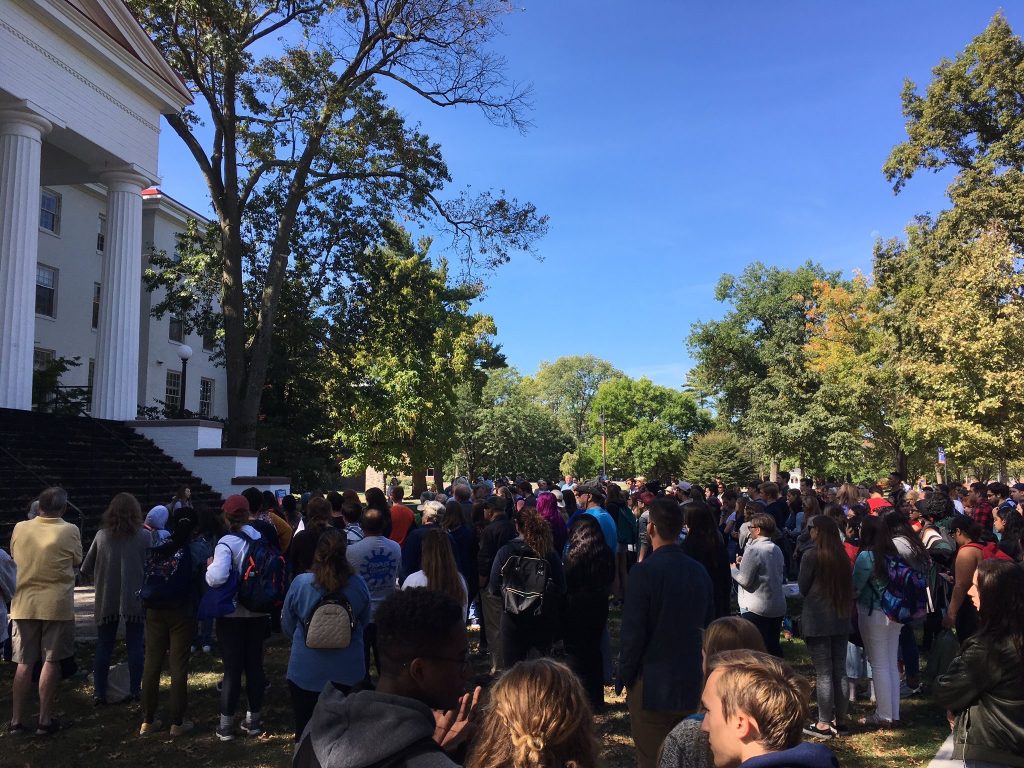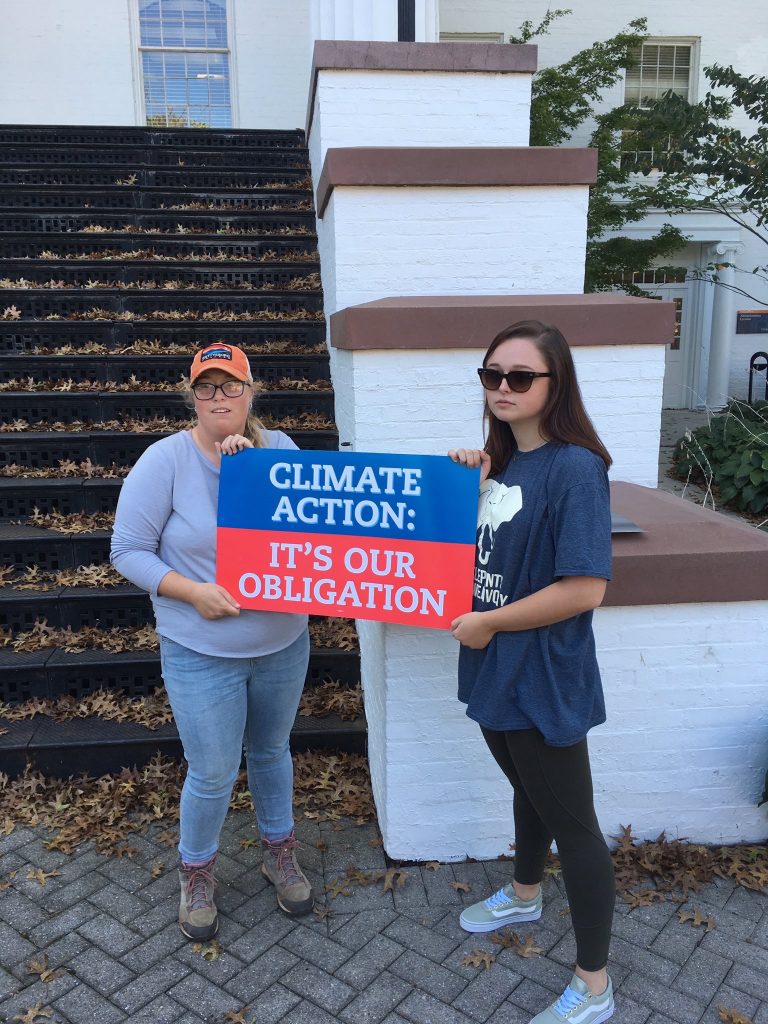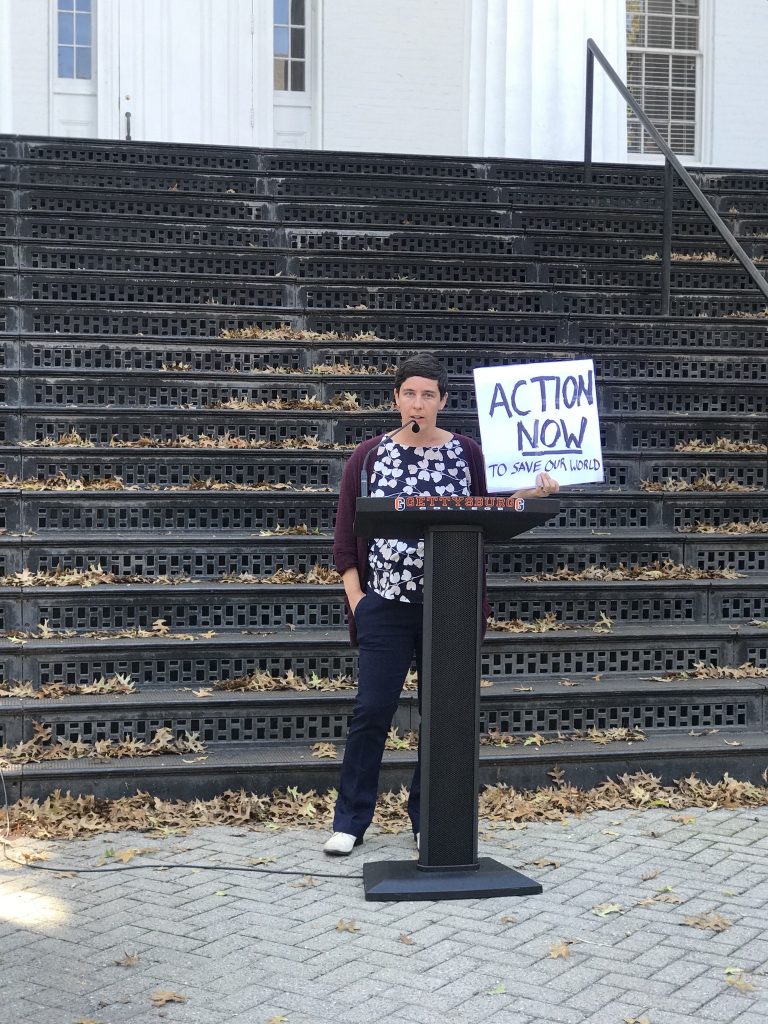The Gettysburg Climate Strike: The Power of Activism
By Brandon Ryan and Mariam Traore

Friday, September 20 — On the first day of the Global Climate Strike, Gettysburg College students, community members, and faculty gathered outside of Pennsylvania Hall to speak on the powerful effects climate change has had in their own lives, as well as the lives of those who are underprivileged. This climate activism not only served as a springboard for campus environmental initiatives, but also presented a clear image of the desire of students to address this problem and hold Gettysburg College accountable for their action or lack of action towards climate change.
In accordance with the national climate strike and other colleges’ participation, Gettysburg College took the initiative of planning its own version of the protest on its campus. Nearly two hundred people attended, with dozens of students and faculty speaking passionately into a microphone, receiving cheers and applause for their bravery.
Protests like these on college campuses have become increasingly common in an effort to recognize the reality of climate change, and the negative impacts it is having, particularly on college-aged youth. William Lane, a Gettysburg English professor and the leader of Green Gettysburg emphasizes the effect this issue is having specifically on America’s youth, a group that will experience a notable change in their lifetime.
“We have a very big problem… It is an existential threat to all of us, especially because the younger you are the more you stand to lose.”
This threat to younger generations has ignited a fire beneath them, which has been seen in the passionate testimony given by Gettysburg students. Throughout the protest, dozens of Gettysburg Students spoke on the urgency of climate change and demonstrated something that should not be taken for granted: passion.

Passion stood out to Lane as perhaps the most crucial component of the Gettysburg Climate strike: “I thought the student speakers were marvelous and incredibly disciplined. Passionate but disciplined. I was just in awe because I’ve been through so many years of people standing up and sounding off… I felt like every student who spoke was so succinct and stopped at just the right time.”
While passion is important, the perceived lack of action is cited as the reasoning behind its ineffectiveness. According to the Gettysburgian, the Gettysburg College newspaper, “without a call for change, solidarity is silent and inconsequential.” While the absence of a petition did make for a less effective strategy, student engagement is not something to be passed off as “silent”.
Not only was the Gettysburg College climate strike published in the local newspaper, but the local high schools’ strike was as well, showing that public schools have the capacity to spread their opinion in a way that garners attention. This attention brings climate change to local officials’ attention, but beyond this, it brings attention to where it is really needed: the classroom.
The Gettysburg climate protest brought about several discussions in various classes focused on the power of protest and the irreversible effects of climate change. While in the basic college curriculum there is usually some form of climate change education, it is not always in a form of discourse that encourages students to share their thoughts and collaborate. These classroom discussions serve as a way to help students foster ideas on how to combat these issues. While usually theoretical, it encourages a conversation which ideally spreads out of the classroom and translates to activism such as these strikes, or helps spread general awareness of the issue.
Not everyone has the ability to show their support for this cause through strikes and protests. With the large turnout of the Gettysburg Community, there were still some faces missing. In order to get a sense of why some familiar faces including other Environmental Studies students didn’t show up, we interviewed Nate Doherty. Doherty, an Environmental Studies and French double major, did not attend the Climate Strike on campus simply because he was not aware of its existence. This presents a unique challenge in the digital age, in terms of how to balance social accountability and effective online communication.
Online activism presents new challenges but it opens up a world of opportunity for those wanting to take a more multimedia approach to the issue of climate change. Online protest allows for new ‘forms’ of protest that can trigger cascades of change, as discussed by Jenny Pickerill in her book Cyberprotest: A New Politics of Protest? In her discussion, we can see the scope of online activism and protest, and understand how its benefits far outweigh its shortcomings.
Professor Lane, who has been an activist in Gettysburg since the 1990s recalls the enormity of this unity, stating how he has “never done such a big and collaborative project with my classes” and looks forward to what the conversations will incite.

Beyond just conversation, the college itself has begun looking into hiring a new faculty member to assume the role of a sustainability head that will oversee the practices of Gettysburg College and how they fit into sustainability as a whole. Several students have also taken it upon themselves to review and critique Gettysburg college’s sustainable action plan, with one student completing her thesis on the topic. All of this analysis puts pressure on the college to not only stick to its promises in terms of sustainability but holds them accountable for the actions they have taken.
“It’s a funny thing. I think the more people that talk about climate change openly, the more it legitimizes it as an issue.”
James Mullen, a political science major and peace and justice studies minor, became involved in the strike, and subsequently became an organizer, when a professor in his department contacted him about the possibility of being a part of this national movement. While students united at the rally, departments, and professors collaborated in order to create the rally. The Peace and Justice Department, G.E.C.O., Order of Omega, and the Interfaith Council all came together to create this strike.
Mullen expresses what various students feel in a place as historic but equally as stained.
“Gettysburg is a place with a history of violence, blood, and turmoil, [so] I think Gettysburg is a great place for any issue, as climate change is another form of violence.”
The significance of pressure stands out to Mullen as an important component of accountability. Swarthmore, a fellow liberal arts college, set an example of effective activism with their protest, which caught the attention of Gettysburg professor and director of Peace and Justice Studies, Dr. Hakim Williams.
“It’s important to establish a sense of community, and activism is the best way to do that,” said Mullen.
The community provides a solution to one of the most prominent limiting factors in activists’ minds: ‘No one would listen.’ When you feel alone, you feel powerless, but when you join a like-minded group, you become infinitely stronger in your pursuit of climate justice.
While the Gettysburg climate strike served as a prime example of the power of activism and protest, the absence of a petition to local lawmakers and college officials stands as an area of improvement. Student voices echo important concerns, but the lack of a policy-oriented backdrop limits the future impact of this event. A study conducted to determine the effect of activism on people’s mentality proves, “o increase citizen activism should promote specific beliefs about climate change, build perceptions that political activism can be effective, and encourage interpersonal communication on the issue” (Roser-Renouf et al. 2014) No matter what, Lane attests that “I think the more people that talk about climate change openly, the more it legitimizes it as an issue.”
The goals for protests and strikes are to result in policies being implemented by higher officials, in order to change the impact of a specific issue. Whether it is a climate change strike or the Women’s March, there are several groups of people being impacted directly and indirectly by the lack of change in policies. After conducting a study on youth around the world, Scott Fisher understands that the youth take matters into their own hands because they don’t see change. So when people do not feel heard, they strike and protest and to further support that action, petitions, letters to officials, etc. exhibits the degree at which the change is needed.
Sources
Doherty, N. October 29, 2019. In-person interview by Brandon Ryan and Mariam Traore.
Lane, W. October 21, 2019. In-person interview by Brandon Ryan and Mariam Traore.
Mullen, J. October 25, 2019. In-person interview by Brandon Ryan and Mariam Traore.
Dejacimo, N. 2019. Opinion: Without a Call for Change, Solidarity Is Silent and Inconsequential.
Fisher, S.F. 2016. Life trajectories of youth committing to climate activism. Environmental Education Research 22(2):229-247.
Jaramillo, C. Swarthmore professor urges colleagues to cancel class for climate strike.
Pickerill, J. 2003. Cyberprotest: A New Politics of Protest? Cyberprotest: Environmental Activism Online. Manchester University Press, Manchester, UK:167-181
Porosoff, L., 2014. Exploring why people don’t become activists. Teaching Tolerance.
Roser-Renouf, C. E. Maibach, A. Leiserowitz, X. Zhao. 2014. The genesis of climate change activism: from key beliefs to political action. Climatic Change 125(2):163-178